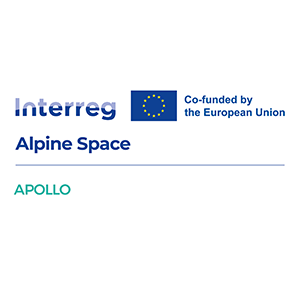
APOLLO – territoriAl corPorate weLfare through digitalization and cOoperation
The Alpine region is undergoing profound social and structural transformations: an ageing population, changing work environments, and the increasing demand for digital solutions in everyday life. Against this backdrop, the APOLLO project—funded by the Interreg Alpine Space programme—develops forward-looking strategies to strengthen corporate welfare and social sustainability across the region. With a strong emphasis on innovation, cooperation, and regional resilience, APOLLO connects key actors to jointly shape the future of work and care in the Alpine space, taking on these challenges.
By fostering close collaboration between public administrations, research institutions, businesses, and other stakeholders, the project supports the exchange of best practices and the implementation of new technologies. Key focus areas include demographic challenges, the introduction of digital care models (such as telecare), flexible work and time arrangements, and the strengthening of small and medium-sized enterprises in rural regions.
Pilot initiatives aim to test innovative solutions and generate policy recommendations that can enhance coordination between legal frameworks and practices across the Alpine countries. The interdisciplinary project consortium includes partners from Germany, Austria, Italy, and Slovenia representing public administrations, research institutions and foundations, supported by a group of observers ensuring that results are broadly disseminated to the public.
Germany is represented in the project by the Steinbeis Transfer Centre for Social and Technological Innovation and the Ministry of Social Affairs, Health and Integration of Baden-Württemberg. So far, we have already gained valuable insights through focus group discussions and workshops. These have helped identify concrete needs and demands that will inform the development of pilot actions. These actions are intended to support and ensure the quality of outpatient long-term care, relieve caregivers, and strengthen informal and family caregiving structures. In doing so, APOLLO aims to ease the burden of care and improve work-life balance on multiple levels.
More Information: https://www.alpine-space.eu/project/apollo/
Funding:
European Regional Development Fund (ERDF)
Grant amount: €1,854,750.00
Total project budget: €2,473,000.20
Project Duration:
Start: 9/2024
End: 08/2027
Link APOLLO-Projekt: https://www.alpine-space.eu/project/apollo/